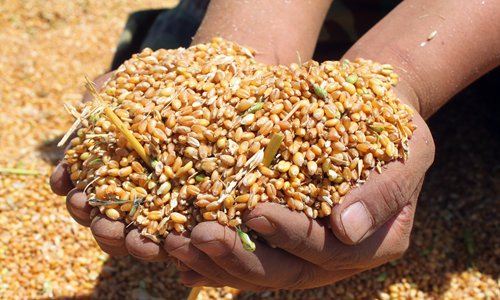China needs to prepare for risks from Russia’s grain export ban
Source:Global Times Published: 2020/4/27 21:31:53

Photo: IC
While the recent suspension of Russia's grain exports may not pose a direct threat to China's food security, it could forebode a profound change to the supply structure of China's agricultural products.Russia has reportedly exhausted its grain export quota earlier than expected, meaning the world's biggest wheat exporter will suspend grain exports until July 1. And Russia is not the only country that has imposed a ban on grain exports in recent days. As the coronavirus pandemic disrupts normal farming activities and sparks fears over food security, major grain producers around the world have restricted exports to ensure sufficient supplies for their domestic markets.
Although China is one of the world's largest importers of grain, it will have no problem ensuring its own food security due to its high level of self-sufficiency in staple grains. Yet global anxiety over food supplies will exert certain pressure on the country's future grain imports, which will likely cast a shadow on the domestic supply of agricultural products in the short term.
One of the most immediate effects will likely be upward pressure on food prices. Take soybeans as an example. In early April, Russia announced it would impose a ban on soybean exports to China until the end of June, while some other countries including Belarus have reportedly issued similar soybean export bans. China is the largest global importer of soybeans, which are mainly used to produce animal feed in the country. In 2019, China imported a total of 88.51 million tons of soybeans, accounting for about 85 percent of domestic consumption.
For now, China may still be able to source its soybean supply from Brazil and the US, but if more soybean exporters impose bans due to unexpected coronavirus impact, then China's domestic feed production could be directly impacted, which will in turn affect the supply of other agricultural products like pork.
In this sense, the COVID-19 pandemic has disrupted the global supply chain for agricultural sector, which will likely be reflected in food prices in the near future.
When the global market is unable to provide sufficient supplies, China will have to rely more on its domestic agricultural industry. There is no denying there may be supply shortages for certain agricultural products, which will not pose a direct threat to food security but are bound to affect production of certain agricultural products like pork and processed food, at least in the short term.
Nonetheless, we cannot blame Russia or any other country for failing to sell what we want. Prioritizing domestic needs is always understandable, especially as the pandemic has rocked global industrial chains. Current grain export suspensions won't affect China-Russia relations. If anything, the two need to work to strengthen cooperation and coordination in terms of international supply chains once the pandemic is brought under control.
Posted in: GT VOICE